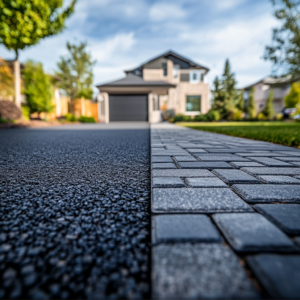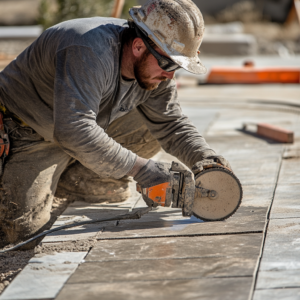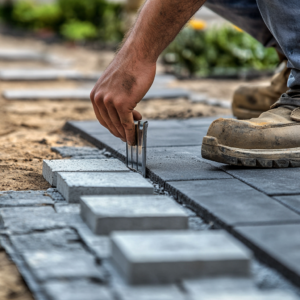The question “Should pavers be sealed or not?” is frequently the reason for doubts. After all, is it necessary? One of the most prominent aspects of pavers is their durability and beauty. But not everyone clearly understands what role sealing plays in that.
With that in mind, we’ve decided to examine the most frequent questions and doubts about this topic. That way, not only will we answer them, but we will also explain what effect sealing has on pavers. Thus, you will be free to make your choice knowing the consequences.
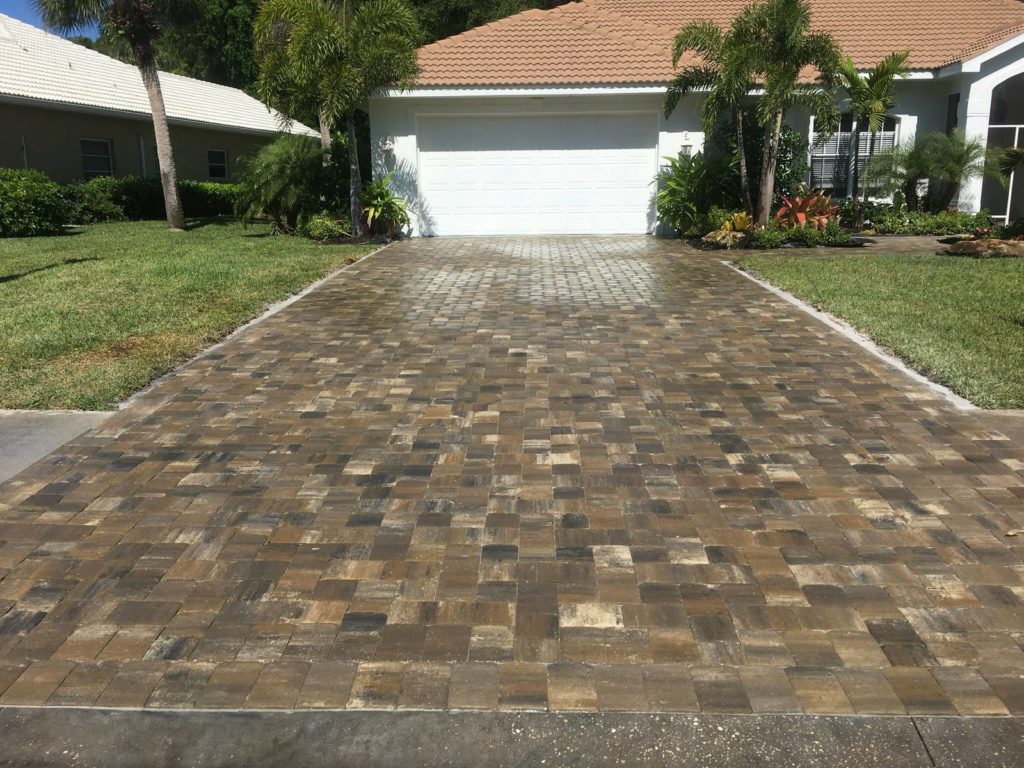
Jump to:
What Is a Paver Sealant?
Easily put, the sealer is a liquid used to cover pavers, and it falls, mainly, into two categories, film-forming, and non-film-forming. Despite the particularities, the main objective of the sealer is the same, to protect pavers, especially against liquid infiltration. Pavers are pervious, meaning they easily assimilate other liquids, including paints and other substances that may leave stains. The sealer acts as a protective layer that makes this absorption more difficult.
Should Pavers Be Sealed?
Yes, you should probably seal your pavers. If the question was: Doo pavers need sealing, the short and quick answer to it would be no, you don’t need to seal your pavers. They will last long without pavers, but probably not look as good as you hope. Sealing plays a crucial role in pavers’ durability and beauty.
Think about it this way: you want to make sure to protect your investment. Paver sealant is an important maintenance tool to keep paver patios, walkways, driveways, and pool decks looking as beautiful as they were when you first installed them.
What Are The Benefits Of Sealing Pavers?
Like any other surface exposed to sun, rain, and other factors, pavers need protection and regular maintenance to keep them looking beautiful for many years.
But the benefits of sealing pavers don’t stop just with aesthetics; it can also have a positive impact in many ways, such as:
- Inhibits weeds and grass in joints;
- Reduces moss growth;
- Prevents ants and other insects;
- Limits loss of sand in joints;
- Helps repel oil, grease, grime, and stains;
- Offers an easier routine cleaning;
- Enhances color, texture, and brightness;
- Resists the effects of harsh weather conditions;
- Protects from salt damage;
- Reduces surface deterioration and wear;
- Reduces paver loosening and cracks;
- Assures long-lasting beauty and value;
However, it’s important to note that all benefits listed above rely on the proper application of the sealant. You should always use quality material. That’s why we recommend you hire a pro.
How Often Should Pavers Be Sealed?
There is no right answer to that question. However, we recommend that you do it every 3 to 5 years. You should keep your eyes open to notice when the sealing layer starts to wear away.
Especially on rainy days, you will notice a significant change in the pavers’ color. If this happens, it’s likely because the sealant is wearing thin. For film-forming sealers, you will notice when they start to peel.
How long a sealing application will last depends a lot on the conditions to which they are exposed. Some situations can speed up the wear process. For instance, the number of times you do heavy cleaning. Likewise, using a pressure washer can also gradually remove the sealer. Weather is yet another relevant aspect to take into account. Exposure to sun, rain, or snow will directly influence the sealer’s durability.
But one thing is sure, sealed pavers will be protected from all these factors and will continue beautiful for much longer.
Does Sealing Pavers Make Them Slippery?
Well, that depends. It’s important to note that most surfaces become slippery when wet or due to accumulated rainwater.
For pavers, it varies a lot according to their class. For example, pavers with a more porous surface tend to be much less slippery. On the other hand, travertine pavers, for instance, can be more slippery. But that’s nothing out of the ordinary, no more than it would be even without a sealer.
Sealer technology has advanced year after year, in such a way, that currently there are formulas specially developed for those surfaces. This way, the sealer not only protects against everything we’ve mentioned before but also reduces how slippery the pavers will be.
How Sealing Pavers Prevent Weeds?
To answer that question, first, we have to understand how that happens.
Weeds grow between pavers through leftover seeds, which are taken there by wind, rainwater, and even by insects or birds. When the sealer comes in contact with the sand between the pavers, it turns it hard, similar to a mortar.
Sealers harden this sand creating an ecosystem that makes it extremely difficult for weeds to germinate and grow.
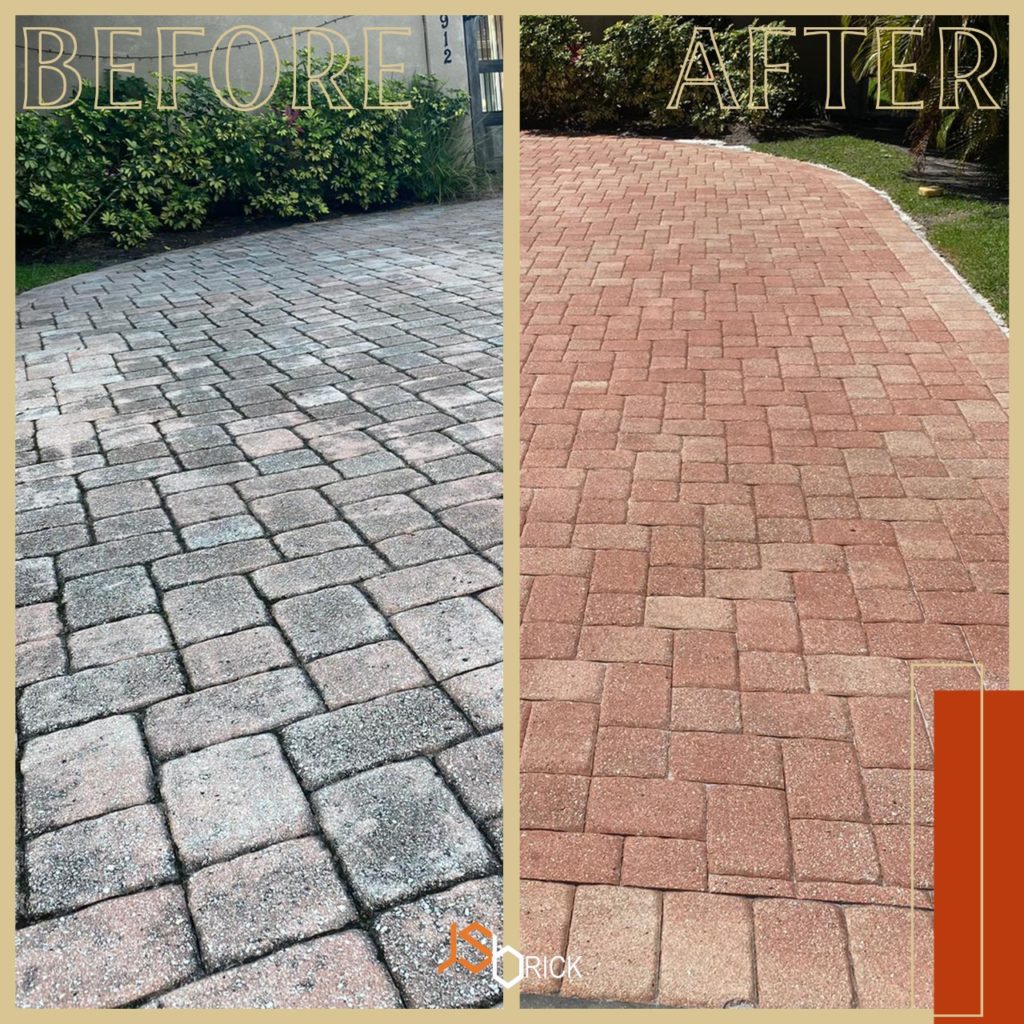
Can You Pressure Wash Sealed Pavers?
Using a pressure washer is one of the easiest and fastest ways to clean pavers, but it is also the one that most quickly removes the sealer. Firstly, we recommend you hire a professional or company for heavy cleaning, as they will reapply the sealer afterward. Ideally, one should always reseal pavers after pressure washing.
JSBrick has 20+ years of experience providing paver installation, cleaning, and sealing services in Sarasota and surrounding cities. For a free estimate on your paving project, don’t hesitate to leave us a message or call us at your earliest convenience.

